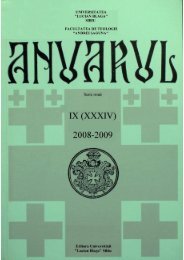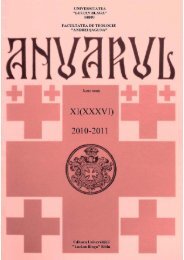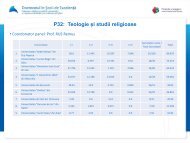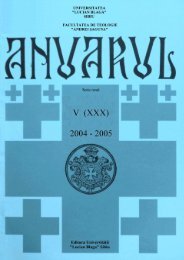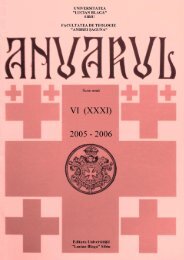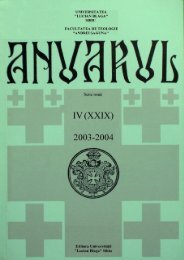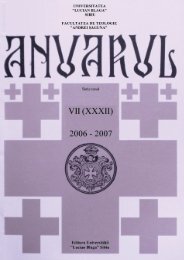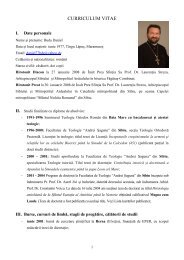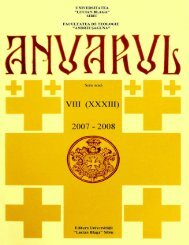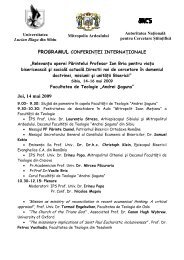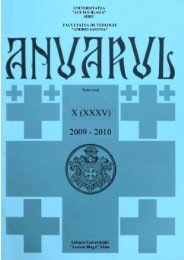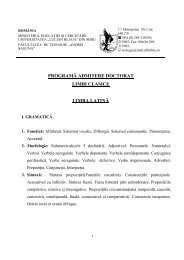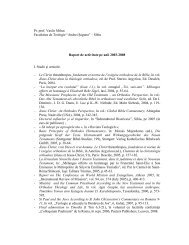Untitled - Facultatea de Teologie "Andrei Saguna" - Universitatea ...
Untitled - Facultatea de Teologie "Andrei Saguna" - Universitatea ...
Untitled - Facultatea de Teologie "Andrei Saguna" - Universitatea ...
Create successful ePaper yourself
Turn your PDF publications into a flip-book with our unique Google optimized e-Paper software.
Atitudinea creştinilor din primele veacuri faŃă <strong>de</strong> pace,potrivit lucrării Istoria bisericească (H. E.)a lui Eusebiu <strong>de</strong> CezareaPr. Lect. Univ. Dr. Daniel BudaAbstractThe paper „Attitu<strong>de</strong> of Christians from the first Centuries regarding Peace, based onHistoria Ecclesiatica of Euseb of Cesarea” analyzes peace and peace related aspects of thiswork. It is structured on five chapters <strong>de</strong>dicated to following issues: 1. Jewish people assubject of violence; 2. Martyrdom and its interpretation by Euseb; 3. Personalities ofChristianity as peace makers and peace negotiators; 4. Christians’ attitu<strong>de</strong> regardingheresies; 5. Possible support provi<strong>de</strong>d by God of Christians to Roman army before the timeof Constantine. The conclusions of the paper are: 1. Jewish people is presented in H. E. asmain subject of violence while Christians are enjoying peace provi<strong>de</strong>d by Jesus Christ; 2.The peace of Christians is broken from time to time by persecutions that produce martyrs.Their attitu<strong>de</strong> is to respond with non-violence to violence knowing that it is just a questionof time until they will conquer the world with their peaceful attitu<strong>de</strong>; 3. Christianity hasamong its personalities men that are characterized as “peace makers.” H. E. presents also astory where clergy people are peace negotiators (H. E. VII, XXXII, 7 12); 4. H. E. presentsa clear non-violent attitu<strong>de</strong> of the early Church regarding heresies and heretics. They can becriticized by preaching or writing against them, but they cannot be subject of humanviolence; 5. H. E. V, V, 1-7 presents a story that is interpreted by Euseb as an example ofGod’s intervention on the si<strong>de</strong> of Roman army in the pre-Constantine period. Theimplication of this story seems to be the i<strong>de</strong>a that God of Christians can replacesuccessfully pagan gods also in protecting the Roman Empire.Studiile mo<strong>de</strong>rne privind atitudinea creştinilor faŃă <strong>de</strong> pace cuprind îngeneral şi câteva referiri la poziŃia în acest sens a creştinilor din primele veacuri. Seafirmă, <strong>de</strong> obicei, că creştinii au fost „făcători <strong>de</strong> pace” în a<strong>de</strong>văratul sens alcuvântului, în<strong>de</strong>plinind astfel porunca Mântuitorului <strong>de</strong> a nu răsplăti răului cu răuşi <strong>de</strong> a-şi întoarce, la propriu, şi celălalt obraz, în cazul în care au fost loviŃi. Maiîntâlnim <strong>de</strong> asemenea adăugată afirmaŃia că creştinii, fiind lipsiŃi <strong>de</strong> responsabilităŃidirecte în stat, <strong>de</strong>ci inclusiv şi <strong>de</strong> atribuŃii legate <strong>de</strong> apărarea, lărgirea sau întărireaacestuia, nu au fost nevoiŃi să aibă vreo atitudine bine <strong>de</strong>finită faŃă <strong>de</strong> războiul59



